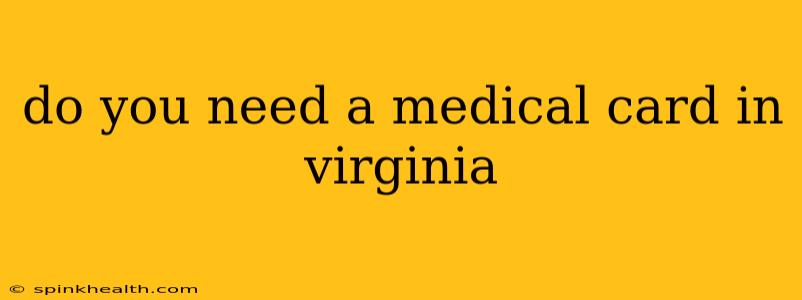Do You Need a Medical Card in Virginia? Navigating the World of Medical Cannabis
The question of whether you need a medical card for cannabis in Virginia is a bit more nuanced than a simple yes or no. The Commonwealth of Virginia has taken a significant step towards cannabis legalization, but the landscape is still evolving. Let's unravel the complexities and answer some key questions.
What is the current status of cannabis in Virginia?
Virginia legalized recreational marijuana for adults 21 and older on July 1, 2021. This means that adults can legally possess up to an ounce of marijuana and grow up to four plants at home for personal use. However, this doesn't mean the need for a medical card has completely vanished. The system is still transitioning, and certain aspects remain regulated under the medical cannabis program.
So, do I need a medical card for recreational use?
No, you do not need a medical card to legally purchase and possess marijuana for recreational use in Virginia if you are 21 or older. The recreational market is largely separate from the medical program.
When might a medical card be beneficial in Virginia?
While not required for recreational use, a medical cannabis card can offer several advantages:
- Higher purchase limits: Medical patients may be able to purchase larger quantities of cannabis than recreational users. The exact limits vary depending on the specific regulations and the physician's recommendations.
- Access to different products: The medical cannabis program may offer a broader range of cannabis products, including those with higher THC content or specific formulations not always available in recreational dispensaries.
- Potential tax benefits: While regulations may change, there might be tax advantages associated with purchasing cannabis under the medical program.
What are the requirements to obtain a medical cannabis card in Virginia?
Even though a medical card isn't mandatory for recreational use, the process is worth understanding. To obtain a medical cannabis card in Virginia, you will need:
- A qualifying medical condition: Virginia's law specifies a list of qualifying conditions, such as epilepsy, cancer, and multiple sclerosis. You must be diagnosed with one of these conditions by a licensed physician.
- Recommendation from a registered physician: A doctor registered with the state's medical cannabis program must certify your condition and recommend cannabis as a treatment option.
- Registration with the Virginia Board of Pharmacy: You will need to register with the state's board to officially obtain your medical card.
How do I find a physician who can certify my condition for medical cannabis?
The Virginia Board of Pharmacy's website is a good starting point for finding registered physicians and obtaining information about the registration process.
What are the potential disadvantages of obtaining a medical card?
While there are potential benefits, getting a medical card also has some drawbacks:
- Added cost and paperwork: The process of obtaining a card, including doctor's visits and registration fees, can be more expensive and time-consuming than simply purchasing recreational marijuana.
- Disclosure concerns: Depending on your occupation or other circumstances, having a medical cannabis card might have implications regarding disclosure.
Is there a waiting list for medical cannabis cards in Virginia?
The demand for medical cannabis cards in Virginia can fluctuate, but significant delays are usually not reported, unlike in certain other states. Checking the Virginia Board of Pharmacy's website for the most up-to-date information is always recommended.
In conclusion, while Virginia has legalized recreational marijuana, a medical cannabis card can provide certain benefits for qualifying individuals. Whether or not obtaining one is right for you depends on your individual circumstances, health needs, and personal preferences. Always consult with a healthcare professional and research the current state regulations before making any decisions.

